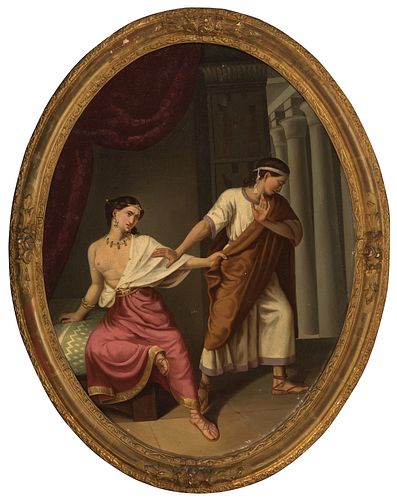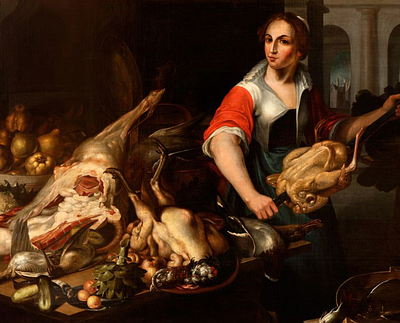Spanish school; ca. 1850. "Joseph and the wife of Potiphar". Oil on canvas.
Lot 26
About Seller
Setdart Auction House
Carrer Aragó 346
Barcelona
Spain
Setdart Subastas was born in 2004 and is currently the first online art auction in Spain with solidity, prestige and reliability guaranteed by our more than 60,000 users. Setdart has a young, dynamic and enterprising team ready to successfully manage the purchase and sale of art works through custom...Read more
Estimate:
EUR€1,500 - EUR€2,000
$1,612.90 - $2,150.54
Absentee vs Live bid
Two ways to bid:
- Leave a max absentee bid and the platform will bid on your behalf up to your maximum bid during the live auction.
- Bid live during the auction and your bids will be submitted real-time to the auctioneer.
Bid Increments
| Price | Bid Increment |
|---|---|
| EUR€0 | EUR€10 |
| EUR€200 | EUR€25 |
| EUR€500 | EUR€50 |
| EUR€1,000 | EUR€100 |
| EUR€3,000 | EUR€200 |
| EUR€5,000 | EUR€500 |
| EUR€10,000 | EUR€1,000 |
| EUR€20,000 | EUR€2,000 |
| EUR€50,000 | EUR€5,000 |
About Auction
By Setdart Auction House
Nov 3, 2021
Set Reminder
2021-11-03 08:00:00
2021-11-03 08:00:00
America/New_York
Bidsquare
Bidsquare : OLD MASTERS
https://www.bidsquare.com/auctions/setdart-auction-house/old-masters-7786
Setdart Auction House sofia@setdart.com
Setdart Auction House sofia@setdart.com
- Lot Description
Spanish school; ca. 1850. "Joseph and the wife of Potiphar". Oil on canvas. Presents repainting and period frame. Measurements: 73,5 x 56,5 cm; 83,5 x 66 cm (frame). Based on the scriptures of the Genesis this work narrates visually, the attempt of the wife of Potiphar to seduce Joseph. Potiphar, who was a high ranking member of Pharaoh's court, had acquired Joseph, who had been sold into slavery. After his diligence, Potiphar, appointed Joseph head of the house, it was at that time, when Potiphar's wife began to notice Joseph, trying to seduce him. Taking advantage of an occasion when the house did not have any of the men in charge, the woman insinuated herself to Joseph, who fled. However, upon Potiphar's return, the woman accused Joseph of attempted rape, for which Joseph was sent to prison. This scene shows the moment in which Joseph tries to flee, while the woman grabs him, trying to restrain him. Located in a room of clear classical inspiration, the two characters are arranged in the center of the oval composition. Regarding the rest of the elements that make up the scene, the crown, the slippers, and the pearls indicate the high social status of the protagonist. However, the most remarkable feature of the work lies in the expressiveness achieved through the gesture of the faces, the volume of the bodies, the angularity of the folds of the clothes, and to a greater extent the posture. Which concentrates the movement of the scene, in a composition that oscillates between the classic triangle and the cross, developed in full baroque. The woman not only grabs Joseph by the arm, but also moves one leg forward. For the type of workmanship and dynamic composition the work is very reminiscent of some of the works of Antonio Maria Esquivel (Seville, 1806 - Madrid, 1857). Esquivel was the most representative and prolific painter of Sevillian romanticism, and one of the most outstanding of his time in Spain. His life was a true romantic plea; lost his fortune after the death of his father, he was orphaned and poor, with seventeen years he enlisted against the absolutist cause of the Duke of Angoulême, and did not live comfortably until his move to Madrid in 1831.
- Shipping Info
-
In-house shipping available. Please inquire at admin@setdart.com.
-
- Buyer's Premium



 EUR
EUR CAD
CAD AUD
AUD GBP
GBP MXN
MXN HKD
HKD CNY
CNY MYR
MYR SEK
SEK SGD
SGD CHF
CHF THB
THB
















